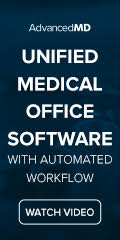The article about Pediatric Associates in CA has a nugget with a potentially outsized impact: the implication that VFC vaccines…
An HIT Moment With … Jim Riley
An HIT Moment with ... is a quick interview with someone we find interesting. Jim Riley is president of Capario.
There are dozens of RCM vendors offering different services and serving different constituents. How would you categorize the major market segments and where does Capario fit in?
I would say the vendors in our market fall into one of three general groups.
The “back-end guys” are the legacy players whose primary value play is on the payer side. They have strong back-end payer connectivity, but their submitter offerings are lackluster. That’s because the bulk of their business and revenue is derived from the payers, which causes them to have a payer-centric view of the industry.
The “front-end guys” are the newer generation of clearinghouse/RCM vendors who came in with a submitter-focused strategy and new RCM solutions over the last 10 years or so. They built good front-end solutions, but rely on connectivity from other vendors. Transactions from this group are typically bouncing around to multiple different points to reach their final destination.
And then there are the “captive-audience players” who are primarily run by the demands of a parent organization. There are a number of vendors in the RCM space who are owned by a payer, a group of payers, a practice management or billing system, etc. Each of them has good offerings but their situation results in an owner-centric disposition of the industry. This group tends to be the least flexible of the three.
Capario really is a best of both worlds, blending of the first and second groups. We’ve been around for more than 20 years and have amassed thousands of direct connections with payers. This helps us to know how payers think and allows us to customize payer edits that we can push directly to the provider. That said, providers will always be our primary customers. It’s where we provide value in the revenue cycle. We’ve built our company’s focus around the needs of the provider community and have built one of the industry’s leading RCM portal applications.
CMS will begin accepting 5010 claims as of January 1, 2011 and the new format will be required by January 1, 2012. Is Capario, and more importantly providers, going to be ready for these deadlines?
Capario will be ready and we are actively testing with a handful of our customers and partners today. We think the vast majority of payers and large providers will be ready by 1/1/2012 as well. Some smaller submitters will struggle to meet the deadline but we have solutions to help them bridge the gap.
The bigger concern, frankly, is timing. Very few entities are ready today and we anticipate an incredible crush on resources and testing during the latter half of this year. It will be challenging, but these types of industry mandates are where Capario earns its stripes. Our plan calls for the ability to readily translate into and out of 5010 format as needed by our submitters and our payers. The industry needs entities like Capario to create flexibility around the implementation deadlines for all parties in order to ensure a smooth transition.
How will the transition to ICD-10 affect Capario and other claims clearinghouses over the next few years?
From a systems perspective, once we complete our 5010 system updates this year, we will be able to accommodate the ICD-10 codes. The bigger challenge will be with clients whose Practice Management Billing System cannot generate an ANSI 5010 file.
Capario and many of our competitors are currently evaluating different solutions we can offer our clients that choose not to upgrade their system to the 5010-compliant version. Those options include both revisions to legacy file formats to accommodate ICD-10 codes and online portal solutions to allow customers to select the appropriate ICD-10 code for their claims. This is still a very fluid situation and we are actively pursuing all options to ease this transition for our customers.
If you could give a practice five criteria on which to choose an RCM vendor, what would they be?
Look for vendors that offer the most direct routes to the broadest list of payers. This is really important for two reason. You don’t want to make unnecessary stops. Just like with flights, every layover is an opportunity for a delay or problem. And, you want a vendor who’s working directly with payers, that understands each payer’s edits and can push that information to the forefront. A vendor that can validate your files at submission will stop problems at the onset of the process, letting you fix errors and get claims back on their way quickly. No more costly and unnecessary delays.
Find a vendor that has visibility into the entire claims process, not just their portion of it. You need real-time tracking information for every step your claim takes on its way to adjudication and payment. Good, actionable information helps you fix problems fast. Beyond that, the vendor needs to offer business intelligence reporting tools that let you see the macro-level trends happening within your claims. When you have this kind of insight, you can make small billing changes that have dramatic effects on AR days and cash flow.
Find an option with a good and flexible patient eligibility verification system. You want a system that will let you do bulk file (think patient schedule-based) checks as well as ad-hoc individual and group checks. You want all of these options because bulk-file checks are the most effective, but you need the ability to run ad hoc inquiries as well.
Look for a vendor with staying power. Capario has been operating in this space for more than 20 years. There are a number of other long-term players in the industry, but there are also an equal number who have only been around for a few years. Experience really matters in this business.
Lastly, and on a very practical level, use the “contact us” test. Look for a vendor that makes it easy to talk to them. We get new customers everyday who are fed up with one of our competitors. Some won’t disclose support phone numbers. Some only offer e-mail support. Find a vendor who actively promotes how to get a hold of them and lets you talk to a live person. You’ll immediately increase your chances of having a good experience.








I am just curious if the Capario is a spin off from Kareo? Also, have you compared the RCM features of Capario against the Athenas and CareClouds of our world?